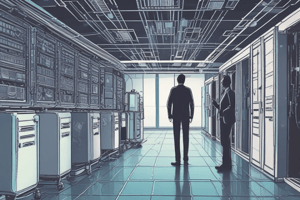Podcast
Questions and Answers
What is the primary role of a system administrator?
What is the primary role of a system administrator?
The management of one or more hardware and software systems to ensure efficiency and effectiveness.
What qualities are important for a system administrator to possess?
What qualities are important for a system administrator to possess?
Communication skills, patience, ability to handle pressure, problem-solving skills, and documentation proficiency.
What is a key consideration for system administrators in terms of computer security?
What is a key consideration for system administrators in terms of computer security?
Deciding on user access and implementing security measures.
Why is routine maintenance crucial for system administrators?
Why is routine maintenance crucial for system administrators?
What should system administrators consider before purchasing new technologies?
What should system administrators consider before purchasing new technologies?
What is a significant responsibility of system administrators in terms of system planning?
What is a significant responsibility of system administrators in terms of system planning?
What is the importance of monitoring system usage and performance for a system administrator?
What is the importance of monitoring system usage and performance for a system administrator?
What are the key responsibilities of a system administrator in terms of security management?
What are the key responsibilities of a system administrator in terms of security management?
Why is it crucial for system administrators to assess new technologies?
Why is it crucial for system administrators to assess new technologies?
What is the role of system planning for a system administrator?
What is the role of system planning for a system administrator?
How does a system administrator approach scaling the system?
How does a system administrator approach scaling the system?
Why is it important for system administrators to apply changes carefully?
Why is it important for system administrators to apply changes carefully?
What is the common practice for system administrators to include in bug queues or ticketing systems?
What is the common practice for system administrators to include in bug queues or ticketing systems?
What should you do before deploying changes to a production environment?
What should you do before deploying changes to a production environment?
What is the key to safely making changes in a system?
What is the key to safely making changes in a system?
What is a good practice to follow if there is some investigation needed before executing certain commands?
What is a good practice to follow if there is some investigation needed before executing certain commands?
How can you assess the risk involved in making changes to the infrastructure?
How can you assess the risk involved in making changes to the infrastructure?
What is reverting to the previous state called?
What is reverting to the previous state called?
Flashcards are hidden until you start studying
Study Notes
System Administration
- System administration refers to the management of one or more hardware and software systems, ensuring that the systems are running efficiently and effectively.
- It is a branch of engineering that concerns the operational management of human-computer systems.
Roles and Responsibilities
- Create and manage user accounts
- Configure and maintain hardware and software
- Provide end-user support
- Perform backup and restore operations
- Maintain documentation and licenses
- Plan and scale the system
- Assess new technologies
- Anticipate and avoid problems
- Manage system security
- Monitor system usage and performance
- Manage resources (disk, memory, CPU)
- Troubleshoot and repair system problems
- Perform upgrades/patches, and test devices
- Schedule downtime to manage devices
Challenges
- Poor quality control in software or procedures
- Problems in operating clashes systems and between their incompatible subsystems
- Software inexplicable phenomena, cosmic rays, viruses, and other attacks
System Administrator Characteristics
- Able to communicate with technical and non-technical users
- Patient and able to handle pressure with a customer service attitude
- Able to solve difficult technical problems
- Knows how to document activities to reproduce results
- Aware of the risks of being a system administrator or sysadmin
System Administrator Tasks
- Manage clients/customers, systems/sites, and organizational policies
- Ensure computer security and access control
- Provide IT infrastructure services (file storage, email, web content)
- Perform routine maintenance (updates and maintenance)
- Evaluate vendor options carefully
- Avoid mistakes and know how to revert to a previous state (rollback)
Applying Changes
- Record actions and include commands executed and output obtained
- Use a test environment (e.g., virtual machine) to test changes before deploying to production
- Assess the risk involved by considering the importance of the service and the number of users impacted.
Studying That Suits You
Use AI to generate personalized quizzes and flashcards to suit your learning preferences.




